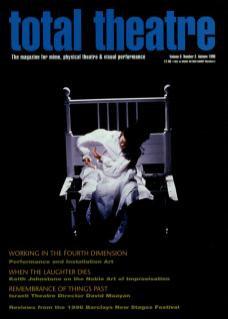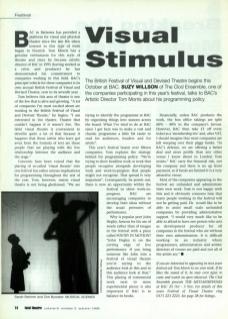BAC in Battersea has provided a platform for visual and physical theatre since the late 80s when interest in this type of work began to flourish. Tom Morris has a genuine enthusiasm for this style of theatre and since he became artistic director of BAC in 1995 (having worked as a critic and producer) he has demonstrated his commitment to companies working in this field. BAC's principal vehicle for these companies is its own annual British Festival of Visual and Devised Theatre, now in its seventh year.
Tom believes this area of theatre is one of the few that is alive and growing, ‘A lot of companies I'm most excited about are working in the British Festival of Visual and Devised Theatre,’ he begins. ‘I am interested in live theatre. Theatre that couldn't happen if it weren't live. The label visual theatre is convenient to describe quite a lot of that because it happens that those artists who have got away from the formula of text are those people that are playing with the live relationship between the audience and the stage.’
Concerns have been voiced that the placing of so-called 'visual theatre' into one festival has rather serious implications for programming throughout the rest of the year. Tom, however, insists visual theatre is not being ghettoised. ‘We are trying to identify the programme at BAC by organising things into seasons across the board. What I've tried to do at BAC since I got here was to make a vast and chaotic programme a little bit easier to read for audiences, funders and for artists.’
This year's festival boasts over fifteen companies. Tom explains the strategy behind his programming policy. ‘We're trying to show headline work or work that people recognise alongside developing work and work-in-progress that people might not recognise. That spread is very important.’ Consequently, he points out, there is now an opportunity within the festival to show work-in progress. BAC are encouraging companies to develop their ideas without the usual pressures of performance.
Why is popular poet John Hegley, famous for his use of words rather than of images in the festival with a piece called Poetry in Motion? ‘John Hegley is on the cutting edge of live performance. If you bring someone like John into a festival of visual theatre you're saying to the audience look at this and to this audience look at that.’ This placing of commercial work next to more experimental pieces is also important if BAC is to balance its books.
Financially, unless BAC produces the work, the box office takings are split 60% - 40% in the company's favour. However, BAC then take £l off every ticket as a 'membership fee' and, after VAT, I should imagine that most companies are left weeping over their piggy banks. ‘In BAC's defence, we are offering a better deal and more profile than any other venue I know about in London,’ Tom insists. BAC carry the financial risk, not the company and there is no upfront payment, so if funds are limited it is a very attractive venue.
Most of the companies appearing in the festival are unfunded and administrate their own work. Tom is not happy with this and it obviously concerns him that many people working in the festival will not be getting paid. He would like to be able to assist small-scale unfunded companies by providing administrative support. ‘I would very much like to be able to afford to have one person who acts as development producer for all companies in the festival who are without their own administrators. It is difficult working in an industry where programmers, administrators and artistic directors of venues are paid and not all of the artists are.’

